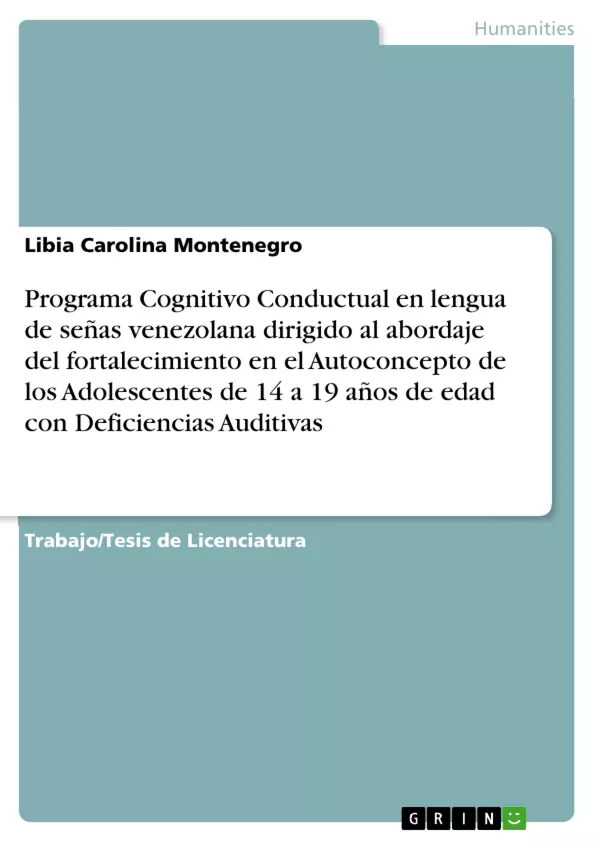El estudio propone un Programa Cognitivo Conductual en lengua de señas venezolana, dirigido al abordaje del fortalecimiento en el autoconcepto de los adolescentes con deficiencias auditivas. Este permitirá la utilización de estrategias terapéuticas cognitivo conductuales como herramienta clave del equipo multidisciplinario en pro de optimizar el manejo del autoconcepto en el sordo. Enmarcado en un proyecto factible, apoyado en una investigación de campo de tipo descriptivo y apoyado en una exhaustiva revisión bibliográfica y documental.
La población estuvo constituida por 45 adolescentes estudiantes de la 3era Etapa media y diversificada de la unidad educativa nacional de educación especial “Maracay”. La muestra fue seleccionada intencionalmente siguiendo el siguiente criterio: Diagnosticados con crisis en el manejo del autoconcepto (fue aplicado el test proyectivo de figura humana de Machover). En cuanto al tamaño de la muestra, se tomó un 38% de la población representada por 17 adolescentes. Como instrumento de recolección de datos fue utilizada la Escala de Autoconcepto Piers-Harris, adaptada a los efectos de este estudio por la investigadora. Fue validado a través del juicio de tres (3) expertos, y para la confiabilidad fue utilizada la fórmula de Kuder – Richardson, obteniendo un coeficiente de 0,80, lo cual indica una confiabilidad alta. Una vez, tabulados, interpretados y analizados los datos se llega a la conclusión, que un alto porcentaje de la muestra evidencia un manejo inadecuado de su autoconcepto, en donde la creación de un programa en lengua de señas venezolana es una opción para mejorar la calidad de vida de los adolescentes sordos. Por lo que se recomienda aplicar y desarrollar el programa cognitivo conductual dirigido al abordaje del autoconcepto en los sordos y que el psicólogo adquiera el aprendizaje de la lengua de señas para así ofrecer una atención óptima al deficiente auditivo.
Inhaltsverzeichnis
- INTRODUCCIÓN
- CAPÍTULO I
- EL PROBLEMA
- Planteamiento del Problema
- Justificación de la Investigación
- Objetivos de la Investigación
- Alcance
- Limitaciones
- CAPÍTULO II
- MARCO TEÓRICO
- Antecedentes de la Investigación
- Bases Legales
- Variables e Indicadores
- CAPÍTULO III
- MARCO METODOLÓGICO
- Tipo de Investigación
- Población
- Técnicas e Instrumentos de recolección de Datos
- Validez y Confiabilidad
- Técnica de Análisis de Datos
- CAPÍTULO IV
- DIAGNÓSTICO QUE SUSTENTA LA PROPUESTA
- Análisis de Resultados
- Conclusiones del diagnóstico
- Recomendaciones
- CAPÍTULO V
- LA PROPUESTA
- Presentación
- Justificación
- Fundamentación Teórica
- Factibilidad de la Propuesta
- Objetivos
- Beneficios
- Estructura de la Propuesta
- Multimedia Cd-Dvd
- Recomendaciones
Zielsetzung und Themenschwerpunkte
Diese Arbeit befasst sich mit der Entwicklung und Implementierung eines kognitiv-verhaltenstherapeutischen Programms in venezolanischer Gebärdensprache zur Stärkung des Selbstkonzepts von Jugendlichen mit Hörbehinderung. Das Programm zielt darauf ab, die soziale Integration, das Selbstvertrauen und das Selbstwertgefühl dieser Jugendlichen zu verbessern.
- Die Auswirkungen von Hörbehinderung auf die Entwicklung des Selbstkonzepts von Jugendlichen
- Die Bedeutung von kognitiv-verhaltenstherapeutischen Ansätzen zur Förderung des Selbstkonzepts
- Die Anpassung von therapeutischen Interventionen an die spezifischen Bedürfnisse von Jugendlichen mit Hörbehinderung
- Die Rolle der venezolanischen Gebärdensprache als Kommunikationsmittel in der Therapie
- Die Förderung der sozialen Inklusion und des Selbstwertgefühls von Jugendlichen mit Hörbehinderung
Zusammenfassung der Kapitel
Kapitel I legt den Fokus auf die Problematik von Hörbehinderung und deren Einfluss auf das Selbstkonzept von Jugendlichen. Hier werden die Forschungsfrage, die Relevanz der Arbeit und die Forschungsziele formuliert.
Kapitel II bietet einen theoretischen Rahmen für die Arbeit, indem es relevante Studien, Konzepte und Modelle zum Selbstkonzept und kognitiv-verhaltenstherapeutischen Interventionen beleuchtet.
Kapitel III beschreibt die Methodik der Forschung, die den Ansatz und die Durchführung des Projekts erläutert.
Kapitel IV präsentiert die Ergebnisse der diagnostischen Phase und analysiert die Daten, die für die Entwicklung der Intervention gesammelt wurden. Die Schlussfolgerungen des Kapitels liefern wichtige Erkenntnisse für die Gestaltung des Therapieprogramms.
Kapitel V enthält eine detaillierte Beschreibung des entwickelten kognitiv-verhaltenstherapeutischen Programms. Es stellt die theoretischen Grundlagen, die einzelnen Komponenten, die Umsetzung und die erwarteten Ergebnisse dar.
Schlüsselwörter
Hörbehinderung, Selbstkonzept, Kognitiv-Verhaltenstherapie, Gebärdensprache, soziale Inklusion, Intervention, Jugendliche, Venezuela.
Häufig gestellte Fragen
Was ist das Ziel des kognitiv-verhaltenstherapeutischen Programms?
Das Programm zielt darauf ab, das Selbstkonzept von Jugendlichen mit Hörbehinderung (14-19 Jahre) in Venezuela zu stärken und ihre soziale Integration sowie Lebensqualität zu verbessern.
Warum wird die venezolanische Gebärdensprache (LSV) genutzt?
Die Nutzung der Gebärdensprache ist essenziell für eine barrierefreie Kommunikation in der Therapie. Sie ermöglicht es den Jugendlichen, ihre Emotionen und Gedanken authentisch auszudrücken.
Wie wurde der Bedarf für dieses Programm ermittelt?
Durch diagnostische Tests wie den Machover-Zeichentest und die Piers-Harris-Selbstkonzept-Skala wurde festgestellt, dass ein hoher Prozentsatz der Jugendlichen ein unzureichendes Selbstkonzept aufweist.
Welche Rolle spielt der Psychologe in diesem Prozess?
Die Arbeit empfiehlt dringend, dass Psychologen die Gebärdensprache erlernen, um eine optimale therapeutische Beziehung und Betreuung für hörbehinderte Jugendliche zu gewährleisten.
Was sind die erwarteten Vorteile für die Jugendlichen?
Neben einem gesteigerten Selbstwertgefühl profitieren die Teilnehmer von besseren sozialen Kompetenzen und einer effektiveren Bewältigung von Krisen im Zusammenhang mit ihrer Identität.
- Quote paper
- Libia Carolina Montenegro (Author), 2007, Programa Cognitivo Conductual en lengua de señas venezolana dirigido al abordaje del fortalecimiento en el Autoconcepto de los Adolescentes de 14 a 19 años de edad con Deficiencias Auditivas, Munich, GRIN Verlag, https://www.grin.com/document/370066



